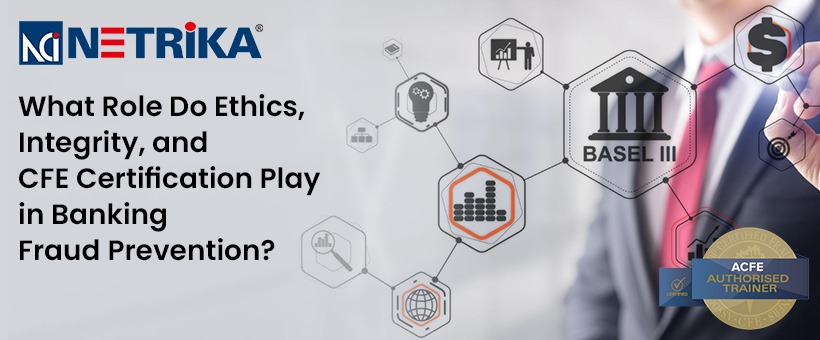News & Events
What Role Do Ethics, Integrity, and CFE Certification Play in Banking Fraud Prevention?
- February 2, 2024
- Posted by: marketing@netrika.com
- Category: Blogs

The banking industry has always been vulnerable to fraudulent threats that not only cause it to have financial losses, and reputation damage but also lead customers to lose trust in the structure, which threatens the economy of a country. In fact, in 2023 alone, the banking sector of India witnessed a total of 13 thousand bank fraud cases. Thus the role of a certified fraud examiner is paramount to securing the banking sector through their ethics, integrity, and professional expertise.
With the integration of technology in the operations of the banking sector, the domain is now even more exposed to cutting-edge risks that cannot be simply detected and mitigated by implementing technologically-driven strategies. These require the amalgamation of ethical conduct and integrity by the bank employees.
A certified fraud examiner has the skillset and knowledge along with the commitment to professional standards and high ethics that combined with the practical skills can help mitigate banking sector fraud.
Here is how the ethics and integrity of a professional with CFE certification help in preventing bank fraud-
- Ethical behavior is the cornerstone of responsibility, accountability, and trust within the banking industry. A professional with CFE certification adheres to these principles with transparency and prioritizes ethics to build customer trust. This trust forms the bond of security during customer transaction operations and employee activities.
- Integrity is the foundation of trust that binds banking employees with reliability, honesty, and consistency in security practices. This ensures a high sense of credibility and dependability on each other while detecting and addressing fraudulent activities.
- Certified fraud examiners possess the skills and specialized knowledge in different types of evolving fraud identification, investigation, and prevention. As a professional with CFE certification are bound by the professional code of ethics as per ACFE (Association of Certified Fraud Examiners), they ensure their work ethics align seamlessly with the banking sector security protocols to mitigate fraudulent activities. They are also required by ACFE to continuously renew their CFE certification, which requires them to engage in professional development, be aware of the latest developments in anti-fraud, and be abreast of the best practices, strategies, and tools to prevent banking sector fraud.
A certified fraud examiner amalgamates ethics, integrity, and conduct as per the ACFE guidelines and adopts a comprehensive approach to fraud detection and prevention. They equip themselves with technical expertise within an ethical framework while maintaining and implementing zero tolerance for fraud and building resilience to protect the banking sector, its customers, and the nation’s economy.

